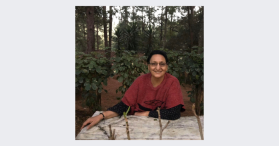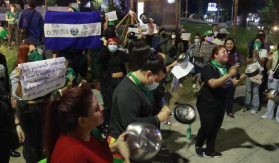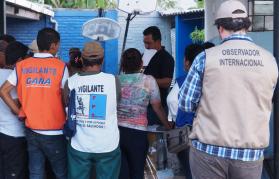A Delegation to Honor El Salvador's Martyrs and Learn About the Ongoing Human Rights Crisis
Reflection by Yesenia Portillo, CISPES Program Directo
At the close of 2022, I participated in the Roses in December delegation hosted by the SHARE Foundation and the Leadership Conference of Women Religious - honoring the 42nd anniversary of the martyrdom of the four Ursuline and Maryknoll sisters killed in 1980 by the U.S.-financed Salvadoran national guard. These four U.S. churchwomen were in El Salvador working with refugee families that had been displaced by the extreme violence and poverty that characterized Salvadoran society in the lead up to the revolutionary armed conflict.
In El Salvador, yearly celebrations and commemorations of the lives of the countless martyrs of the country’s revolutionary struggles are strong traditions that exist among many communities. We attended a commemorative mass at a church built at the site of the church women's' assassination, participated in a procession to and ceremony at their gravesite, along with several other in-person and virtual commemorative events. While I was in El Salvador, I also witnessed and participated in commemorations of other massacres and martyrdoms that are held every year in early December. My family was one of tens of thousands forcibly displaced from El Salvador in the early 80s and I feel deeply grateful for the experience I had this past December. These commemorations are a powerful example of how Salvadorans keep the lessons of revolutionary struggles alive despite the systemic attacks against historical memory under the Bukele regime.
During the commemorative events, I thought about the many ways the brutal military repression and violence that cost these religious sisters their lives continues in El Salvador today. Bukele’s presidency has been characterized by heavy militarization and the nationwide suspension of many essential constitutional rights, first under COVID-19, and now, under a more extensive and seemingly permanent State of Exception.
Since the end of March 2022, Salvadorans across the country have had their due process, freedom of association, freedom of expression, and privacy rights revoked under the pretext of a war on gangs. This has led to wide scale human rights abuses including thousands of arbitrary arrests and prolonged detention without access to trial, particularly impacting El Salvador’s most marginalized, working class and agricultural communities. Human rights organizations that are closely monitoring the situation have reported widespread torture and dozens of deaths inside the country’s prisons under the State of Exception.
On the last morning of the delegation a delegate read to us the news of the municipality of Soyapango being surrounded by 10,000 military personnel armed with tanks and all, with the supposed implementation of the latest phase of Bukele’s “Territorial Control Plan.” Later in the day I heard stories from youth whose friends in Soyapango had called them that morning to describe having woken up to a "wall of green" outside of their windows - filled with uncertainty since they could easily become the next arbitrarily-detained young person. This is why they say "Ser joven en El Salvador es un crimen” (tr: to be a youth in El Salvador is a crime).
The last day of the Roses in December delegation closed with a human rights forum titled, “Justice, Peace and Validity of Human Rights in El Salvador.” The forum, co-hosted by Tutela Legal “Maria Julia Hernandez'' included a musical performance by the Salvadoran singer-songwriter Romeo Reyes, who sang about social movement struggles in El Salvador, remarks from Salvadoran human rights attorney David Morales and Salvadoran priest Padre Chopin, and closed with testimony from representatives of MOVIR (the Movement of Victims of the Regime in El Salavador),whose children have been arbitrarily detained for months, with no end in sight. You can watch the livestream of the forum here.
In his remarks, human rights attorney and Director of Strategic Litigation at the human rights organization CRISTOSAL, David Morales, used the term "collective torture" to describe the treatment of Salvadorans in the country's prisons. Other CRISTOSAL representatives have described the prisons as having “concentration camp” conditions where crimes against humanity are taking place.
Morales opened by discussing the atrocities carried out by the Salvadoran armed forces throughout the 70s, 80s, and 90s, highlighting the fact that the mass disappearances and the massacres of that era could not have carried on for decades without the complicity of El Salvador’s judiciary. He also lamented the ongoing impunity that remained after the Peace Accords with regards to that complicity. Padre Padre Chopin even opened his remarks with an apology for the ongoing impunity of the Salvadoran state in the assassinations of the Ursuline and Maryknoll sisters.
Morales argued that this complicity and impunity play a devastating role in Salvadoran society today where, neither the level of political persecution and mass imprisonment nor the conditions of torture and crimes against humanity taking place in El Salvador’s prisons under Bukele’s State of Exception, would be possible without the complicity of an illegally-imposed Supreme Court, Attorney General and countless judges. They have learned from history of the impunity that too often exists for actions like theirs.
In his remarks, Morales also uplifted the decades-long battle that the victims of El Salvador’s civil war and their surviving families and loved ones have waged in the ongoing fight for justice and juxtaposed that with the work of families of the victims of the State of Exception today.
For several months now, the families of many people who have been arbitrarily detained under the State of Exception despite having no ties whatsoever to organized crime (university professors, young artists, community leaders, working fathers and mothers) have been taking to the streets to denounce these measures and their impacts. Many young children, even babies are being left without their parents - and elderly disabled grandmothers are having to beg in the streets after the arbitrary and unjust arrests of their sons and daughters in order to care for multiple abandoned grandchildren. MOVIR is one such example with membership from across the country.
In the Bajo Lempa, where communities are fighting against land displacement by megaprojects, over 300 people have been arrested under Bukele’s State of Exception; among those, communities have identified over 100 cases where the person has no ties to gang structures. Impacted community members there have organized the Comité de Familiares Víctimas del Régimen Bajo Lempa to fight back against the arrests of their innocent loved ones. It was in one of these communities where 8 underage youth were violently and illegally arrested after performing a popular theater production about military repression in El Salvador.
The Comité de Familiares de Presas y Presos Políticos de El Salvador, COFAPPES is another group of families who have organized to denounce and fight back against the political imprisonment of their loved ones, several of whom remain in prison after nearly two years despite not having been convicted of any crime.
One of the most painful things I gained greater insight on during my time in El Salvador is about the prevalence of forced disappearances. It is common now for people to go from prison to prison searching the lists of prisoners for the names of their loved ones after they’ve been arbitrarily arrested. Many are not found on any of the lists and their families are left to assume they may have already died, as there have been dozens of in-prison deaths since the start of the State of Exception. Many families finally hear word about their loved ones only after they are on the verge of death at the hospital. There have even been cases reported of authorities burying people who had been imprisoned in common graves without informing the family.
These families bear an enormous burden. Many are from extremely marginalized communities and cannot afford the cost of transportation to the one prison, let alone multiple to search for their loved ones, or to drop off prison packages containing food and clothing that families are expected to provide for their loved ones inside.
The fact that they’re taking to the streets despite the enormous threat, is in part a testament to the impossibility of the situation - Salvadorans are faced with the reality that there is nothing else they can do except organize and take to the streets because the attorney general, the judiciary, the courts will do nothing for them individually, even if they can afford a lawyer and even if they have presented all possible evidence of the innocence of their loved ones. Many more are experiencing this in silence, while some are confronting the fear and organizing to be vocal in their denouncements.
It is essential that Salvadorans of conscience in the diaspora organize to fight back against this and that those in solidarity join us in demanding an end to U.S. military and security financing to this regime. I personally have had the opportunity to witness a little more and be enormously motivated by the creative, courageous and committed organizing still taking place throughout El Salvador - women lead, and commemorative traditions keeping historical memory alive.



